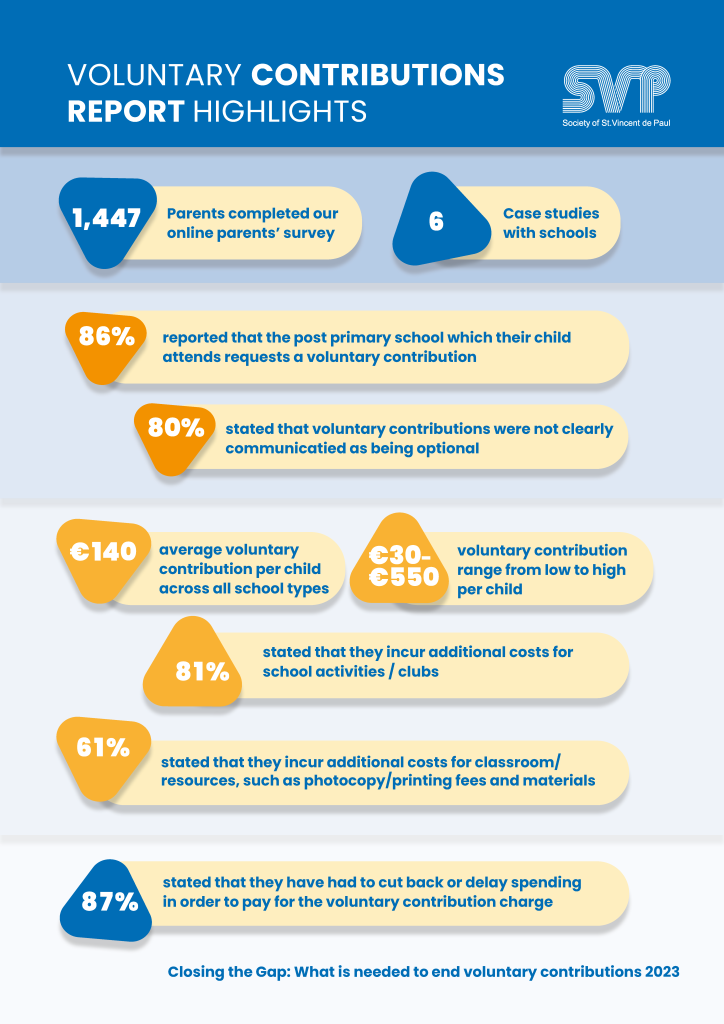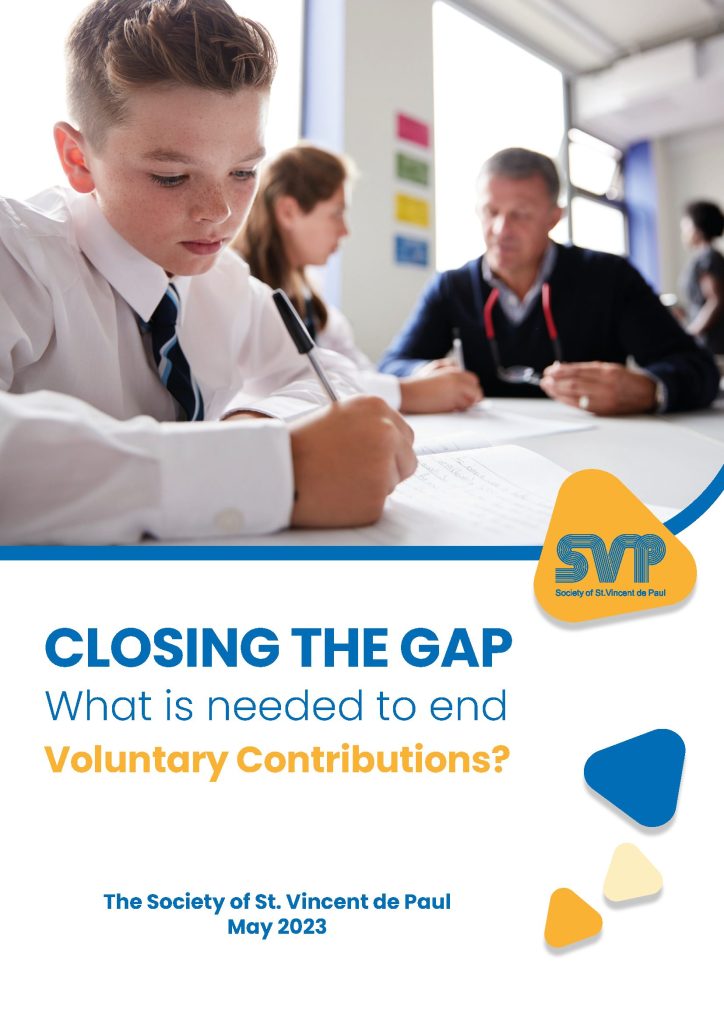
Parents critical of communications around schools voluntary contribution
* 87% of parents said they cut back or delayed spending to pay the school voluntary contribution charge
* Interviews with schools show how years of underfunding has impacted their ability to cover basic running costs
Schools voluntary contributions
A new report published today shows that families finances are greatly impacted by schools voluntary contribution. Many families forego essentials to meet charges and the full cost of accessing post-primary education in Ireland.
SVP published its report: Closing the Gap - What is needed to end Voluntary Contributions in Post Primary Schools today. It was developed from an online parents survey and in-depth discussion with principals of six schools. Grant Thornton conducted the research on behalf of SVP.
Parents Survey Responses
Almost 1,500 parents (1,447) responded to the online survey.
Responses show:
* 87% said they had to cut back or delay spending in order to pay the voluntary contribution charge.
* 86% of respondents reported that their children’s schools requested a voluntary contribution
80% stated voluntary contributions were not clearly communicated as being optional.
* 81% said they incur additional costs for school activities/clubs
61% said they incur additional costs for classroom/resources such as photocopying/printing fees and materials.
* Voluntary contributions range from €30 to €550 per child with an average of €140 per child across all school types.
School Survey Responses
All schools consulted expressed concern about the level of funding they receive. They included the reliance on voluntary contributions for the provision of essential resources such as books, classroom materials, school journals, insurance, stationary, printing and lockers.
Some of the schools said that they have not increased the amount they charged in many years. One school has not raised the voluntary contribution charge in 15 years. One principal said, “Voluntary contributions are a symptom of the underfunding of the education system. We use the payment to cover the cost of running the school on a day-to-day basis.“
The Department of Education guidance to schools clearly states: “Voluntary contributions may be sought from parents. Provided it is made clear to parents that there is no compulsion to pay. And that a child’s place in the school or continued enrolment is not dependant on a willingness to make a contribution.”
Niamh Dalziel, Research and Policy Officer with SVP says: “We also know that schools are underfunded. During the period of austerity, the capitation grant, which covers the basic running costs for schools per pupil, was cut from €345 to €309. In 2020, the rate was €316. To maintain the real 2010 value adjusted for inflation to 2023, the grant should be €422 or 33% higher."
Department of Education Directive
Some schools do not adhere to the Department directive. One parent, responding to the survey said. “It had to be paid or the child did not receive a homework notebook. Teacher would ask where’s your notebook, so all the class would know fees weren’t paid. Very embarrassing for child.”
Another said “On top of the voluntary contribution, there is a €350 fee for transition year. That’s €600 before I buy a book. It has seriously put a dent in our family finances. So much so that I had to borrow money from my family to buy uniforms and shoes.”
Requests for school voluntary contributions causes additional stress
SVP National President Rose McGowan said, “Many parents who took part in the research spoke about the stress caused by requests for contributions, the need to cut back on essential spending, going into debt and feeling ashamed for struggling to meet the costs for their children. This mirrors what we see when working with families who seek our help every year.
“This year we have seen positive policy changes and investment. This will make a real difference in the lives of children and young people. Provision of free school-books at primary level and the extension of hot school meals is very welcome. These are issues we campaigned on for many years. Our research and recommendations are on opportunity to build on this progress.
“We can end schools voluntary contributions by investing in our education system through adequate capitation and free schoolbooks at secondary school. This must be part of a wider effort from educational leadership. To ensure education policy and practice is inclusive and meeting the needs and rights of students from low income and disadvantaged backgrounds.”
SVP Recommendations
Niamh Dalziel says, “SVP wishes to see a solution focused approach to the issue of voluntary contributions and all school charges, which delivers considered responses. This requires clear direction from the Department of Education. This is a complex system across different approaches and school categories. There is not one simple solution. But as well as additional funding, there are some cost-free actions that can be taken immediately to improve student’s educational experience and reduce the burden on families.”
Voluntary contribution charges are baked into schools’ financial makeup. We understand that's the challenge. All education policy should actively be inclusive and in-line with the right to education. From our research and SVP’s extensive experience on the ground we wish to share these six recommendations.
- Introduce and monitor a new regulation on voluntary contributions.
- Increase the capitation grant to ensure that schools can meet running costs.
- Remove all financial barriers to participating in education.
- Policy-proof all policies within schools and across the education system.
- Establish a procurement support service for schools.
- Provide better data and transparency on educational funding expenditure and expenditure.
Closing the Gap - What is needed to end Voluntary Contributions in Post Primary Schools can be found here.




